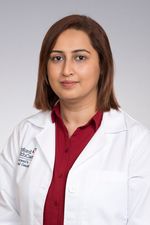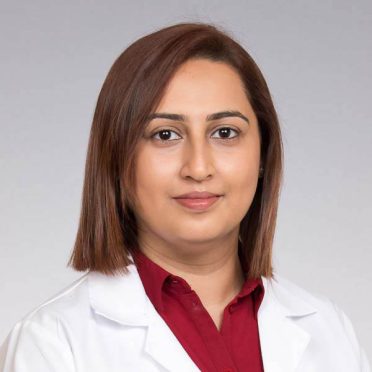In honor of Doctors’ Day March 30, we are highlighting the importance of family and primary care providers. They are the gatekeepers and coordinators of care, and often the first line of defense for patients.
As a young child in Pakistan, Dr. Maryam Syed learned about primary care medicine firsthand through her father, a practicing physician who often treated patients at her family home or on house calls. She saw the strong bonds that providers can form with patients.

She retained that experience as her family immigrated to the United States and she continued with her studies, often volunteering at local hospitals and in research labs in high school.
“The seeds were put there as a child, so it was always in the back of my mind, but my different experiences solidified it,” she said.
Dr. Syed practices family medicine at the newly opened Hartford HealthCare location at 1505 Post Road East, Suite 102, Westport. She sees patients beginning in adolescence through adulthood, and is also trained in pediatrics, obstetrics and gynecology.
“I’ve always liked that aspect of taking care of everybody,” she said of her decision to practice family medicine. “Taking care of the whole family, from the kids to the parents and grandparents. You get to know more than just the medical aspect of their lives.”
When it comes to her approach to care, she focuses on preventive care, educating patients on the importance of regular screenings, such as pap smears, mammograms and colonoscopies.
“Regular age-appropriate cancer screenings are essential for early disease detection and treatment,” Dr. Syed said. “Even in the absence of significant family history, tests such as screening mammograms can help detect abnormalities such as stage zero breast cancer early.”
Here’s a Doctors’ Day visit with Dr. Andrew Wong, also a primary care physician in Westport:
During the pandemic, she saw a higher prevalence of prediabetes, and uses a simple blood test each year to help monitor glucose levels and prevent progression to diabetes.
“A big part of our job is to make sure we catch things before they become an issue,” she said. “We want even the healthy individuals to come in for a yearly exam so we can provide appropriate screenings to them. It gives us an opportunity to evaluate things such as their BMI, blood pressure and cholesterol levels which may be abnormal without the patient’s knowledge. We can use this time to provide appropriate counseling regarding lifestyle modifications and consider medication if needed.
“Many times, these visits become the first opportunity to start treatment for a disease that has the potential to cause significant harm if left untreated.”
Despite the importance of primary care providers, the Association of American Medical Colleges (AAMC) predicts that the U.S. could see an estimated shortage of 21,400 to 55,200 providers by 2033.
“There is definitely a need in primary care due to the large volume of patients and the number of things we treat being the first line of care,” Dr. Syed said. “There is also high burnout among primary care providers. The ones who are available are being inundated with patients. Eventually, this will overwhelm them and start affecting their overall wellbeing.”
Despite the difficulties that often come with practicing family medicine, Dr. Syed said she believes the rewarding relationships she creates with patients outweigh the challenges.
“The pandemic has shown us that this is beyond a job at times,” she said. “I think we’ve all been asked to do more than what we have done in the past and, sometimes, more than what we may be comfortable doing. It’s definitely tough, but there’s always going to be challenges. Somebody has to be brave to take on the challenge.”



